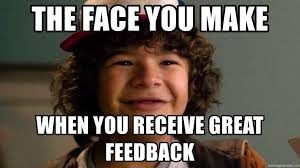There’s a reason writers are neurotic heaps. Creative work involves putting little pieces of yourself on public display and inviting people to stomp on them. For teenagers that may be even worse because what people think of you is all-consuming and social media has made you accessible to everyone.
Any writing group will include kids who are busting to read their stories and kids who would literally rather die. I don’t think anyone should be pressured into sharing their work, but there will be kids who would like to but just lack the confidence, and there are ways you can help them.
First, be aware that there’s a difference between lack of confidence and introversion. Some kids want to be drawn out; for others maybe the writing club is the only quiet or private time they get and they don’t want to share their work.

But if they are shy, there are things you can try.
- Give them time to settle in before you push them to share. Everyone’s shy among strangers
- Make it a general rule that if someone wants feedback on their work this can be done one-to-one with you so no one else has to read it
- Make it a general rule that if someone would like their work read aloud but doesn’t like reading aloud themselves, you can read it aloud for them
- Play ‘Read the last sentence you wrote’. In the middle of the session, stop at a random point and ask everyone to read aloud their last full sentence. This is always funny because, out of context, the sentences can sound completely mad, and it’s less scary because everyone’s sounds weird. I’ve found that even the shy kids usually participate in this. Which could be a way to give them confidence for reading aloud in future
- If they don’t want to read, you can ask if they’d like to tell the group about their piece. Just ask simple questions like ‘Is it a story or a poem?’, ‘What’s it about?’, ‘Is it new or continued from last week?’, ‘Is it going well?’, ‘Do you know what’s going to happen next?’ But if they’d rather not share, don’t push them. And I wouldn’t put a spotlight on them like this until everyone in the group knows each other well
If they do read their work aloud, you and the group can give them feedback on it. Feedback can be tricky because you don’t want to give the impression that their work is being judged or assessed, but you do want to let them know their work is being heard and appreciated. Some kids will actively ask, ‘How can I improve this?’ and some just want to write it, read it, and then move on to the next thing. Both approaches are fine and you can adjust your feedback accordingly.
Feedback is not about assessment but it does contribute to learning. And it plays an important role in a writing club because:
- Everyone needs encouragement to keep going
- It improves our writing craft
- Even those who don’t read their work aloud will learn from giving feedback to others
- Being privy to each other’s work helps the group to bond

I’d suggest that you have some basic group rules for giving feedback, such as:
- Be respectful – listen when someone is reading
- Be positive – tell the writer what you loved about their piece
- Be helpful – give the writer ideas for how they can strengthen their piece
You’ll probably give most of the feedback yourself and the kids may say little more than ‘Wow, I loved that!’ (which is lovely for the writer!) But do encourage the group to give feedback too and they will learn how to do it from watching you.
You don’t need to be a writer to give helpful feedback, you just need to be a reader. You can comment on their:
- Authentic dialogue
- Believable characters
- Vivid descriptions
- Intriguing plots
- Dramatic openings
- Satisfying endings
- Original/beautiful/fresh language
You can make suggestions that might strengthen the effect they’re trying to create. Eg little achievable tips like ‘You could try shortening your sentences to make it sound even more dramatic’ or ‘I don’t think you need this sentence because you’ve said that in an earlier sentence’ or ‘I think fascinating would be a stronger word here than very interesting’ etc. This isn’t the same as being critical, it just shows that you regard their work as so good it’s worth polishing.
If they’re not bothered about polishing, you can just ask about where the story is going next and tell them you can’t wait to hear the rest. In our group we’ve had ongoing epics that the group waited for the next chapter of like it was a Dickens Christmas TV Series. Which must make a change for them actually, considering that everything these days is binge-watched.

I think the main thing is just to be really positive and praise their work so they’ll want to keep going. They’ll get better just through practice if they’re encouraged to keep at it.
And remember, when giving feedback on a young person’s writing, that there’s more to creativity than quality:
- There is quantity – just getting that first draft down on the page is something that not everyone manages
- There is bravery – conjuring up something new out of your head is an incredibly brave act
- There is risk – putting it out there is even braver
- There is persistence – just not giving up is one of the most valuable qualities you can have
- There is effort – these kids are busy and tired and they don’t need to be here, but here they are
- There is mimicry – kids learn everything through mimicry and it’s perfectly OK for them to copy the style of their favourite writer or borrow the TV characters they love
- There is originality – it may be bonkers, it may make no sense whatsoever, it may be downright silly, but could you have come up with it?

Also, special shout out and good luck to the brand new Write Club beginning tonight at Hub Games on the Lisburn Road, Belfast. Open to all teenagers, absolutely free, write what you like! And the mentors are lovely. Enjoy!
Leave a Reply